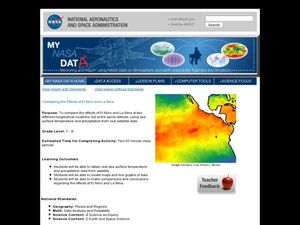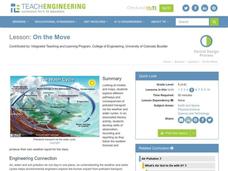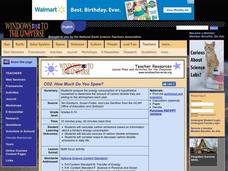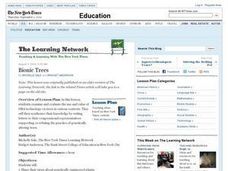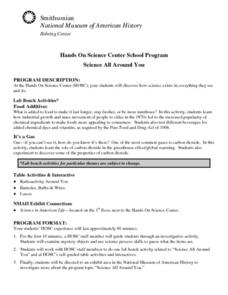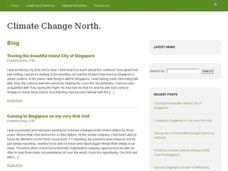Curated OER
Changing Planet: Fading Corals
Show the six-minute video, "Changing Planet: Fading Corals," and then demonstrate how calcium carbonate forms a precipitate in the presence of carbon dioxide. Separate your scientists into small groups to gather information about coral...
Curated OER
Comparing the Effects of El Nino and La Nina
Students examine the differences between an El Nino and La Nina year. For this investigative lesson students create maps and graphs of the data they obtained.
C-SPAN
Why Do Americans Not Vote in Elections?
In an age of inflamed politics, who votes, who doesn't vote, and why are the questions everyone is trying to answer. Pupils listen to scholars, journalists and data crunchers on voting statistics to make their own conclusions. A chart...
Curated OER
Let There Be Peace: Nobel Prize Winners
What is the Nobel Peace Prize? After they establish criteria for great leadership, secondary learners read a New York Times article about President Jimmy Carter's acceptance of the Nobel Peace Prize in 2002. Individuals research the...
The New York Times
Decision Point: Understanding the U.S.’s Dilemma Over North Korea
Simulate the Situation Room and analyze the US's relationship with North Korea. The plan starts off with a quick review and an examination of a online timeline that updates as the situation continues. Next, the class reads an article and...
C-SPAN
Middle School Checks and Balances
Seven video clips reveal how the checks and balances built into the constitutional framework of the United states' government are designed to keep any one branch from becoming too powerful. After watching each clip, groups identify the...
Curated OER
Mellowing With Age, A Closer Look
Students realize that aging is a "natural, continuous process" and develop sensitivity to the needs, desires, and capabilities of the elderly by interviewing elderly community members and photographing age related things.
Curated OER
Your Own Greenhouse
Young scholars discuss the similarities between the Earth's atmosphere and a greenhouse. In this science lesson, students make their own greenhouses out of plastic bottles and thermometers. Young scholars record the temperature different...
Curated OER
Organizational Patterns
Eighth graders identify organizational patterns in their tests. Individually, they list five major organizational patterns and write a definition of each one. Students, in groups, assign responsibilities and complete assignment sheets...
Curated OER
Reducing Your Carbon Footprint to Help the Environment
Students examine their environment. In this carbon footprint lesson, students look at how he/she impacts their environment with the waste they create and the energy they use. As a class they read an article and listen to podcasts on how...
Curated OER
Using Mathematic Models to Investigate Planitary Habitablity
Students examine how the sun's intensity affects the temperature on various planets. They determine whether or not these planets could be habitable. Finally, they factor in the average albedo of the planets to determine whether or not...
Curated OER
Climate Change
In these science worksheets, 5th graders explore aspects of weather and recycling. In the first instructional activity, students are given five questions about weather which they match to the statement about weather that corresponds to...
Curated OER
On the Move
Students explore different pathways and consequences of pollutant transport via the weather and water cycles. They observe and record weather information and produce their own weather report for the class.
Curated OER
The No Zone of Ozone
Students explore the causes and effects of the Earth's ozone holes through discussion and an interactive simulation. Using gumdrops and toothpicks, they conduct a large-group, interactive ozone depletion model.
Curated OER
Climate Change-Boon or Bust for Northern Waters?
Students explore about and evaluate the potential impacts of climate change on northern hydrological systems. They work in small groups, research the background to climate change in the north with a particular focus on lakes and rivers.
Curated OER
CO2: How Much Do You Spew?
Learners analyze the energy consumption of a household to see the amount of carbon dioxide they add to the atmosphere each year. In this energy consumption lesson students calculate carbon emissions and discuss sources of carbon dioxide.
Curated OER
Bionic Trees
Students examine the debate about using trees to clean up the environment by reading and discussing a news article. They research the various contexts for which scientists may want to genetically alter trees and assess the validity of...
Curated OER
Greenhouse Effect
Students investigate the greenhouse effect. In this environmental lesson, students investigate why the greenhouse effect changes the climate through an experiment. Students use vinegar to simulate how acid damages the environment.
Curated OER
Science All Around You
Students visit and explore a Hands On Science Center (HOSC). They participate in a variety of self-guided table exercises and observe as scientists demonstrate various scientific principles.
Curated OER
Climate Change Challenge
Students explore the issue of climate change through participation in an interactive game show. They explore climate change issues in the news. Students write and discuss their own questions about climate change.
Curated OER
World Wetlands Day
In this World Wetlands Day worksheet, students read or listen to a passage, then match phrases, fill in the blanks, choose the correct words, unscramble words and sentences, put sentences in order, write discussion questions and conduct...
Curated OER
Biochemical Cycles: Recycling Carbon and Nitrogen
Students construct flow diagrams of the carbon and nitrogen cycle processes. They identify sequences in each cycle that are affected by human impact and present their research to the class.
Curated OER
Martha Who?
Students explore how the number and types of organisms an ecosystem can support depends on the resources available and on abiotic factors, such as quantities of light and water, a range of temperatures, soil composition. They are...
Curated OER
ESL Holiday Lessons: Bike to Work Day
For this language skills worksheet, students read an article about Bike to Work Day. Students respond to 6 matching questions, 29 fill in the blank questions, 30 multiple choice questions, 12 word scramble ...



